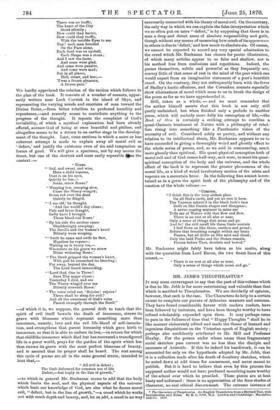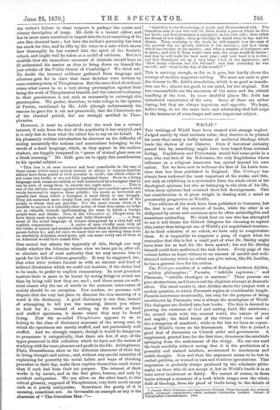MR. JEBB'S THEOPHRASTUS.* IT may seem extravagant to say that
the part of this volume which is due to Mr. Jebb is far more entertaining and valuable than that which is ascribed to Theophrastus. We are decidedly of opinion, however, that such is the case. The Characters do help to a certain extent to complete our picture of Athenian manners and customs. They have found considerable favour with modern readers, have been followed by imitators, and have been thought worthy to have refined scholarship expended upon them. It may perhaps come to pass in the fullness of time that " Happy Thoughts " shall be in like manner elaborately edited and made the theme of learned and ingenious disquisitions on the Victorian epoch of English society ; perhaps also confidently attributed to Mr. Mill and Professor Huxley. For the person under whose name these fragmentary social sketches pass current was no less than the disciple and successor of Aristotle. If this be indeed his handiwork, it can be accounted for only on the hypothesis adopted by Mr. Jebb, that it is a collection made after his death of desultory sketches, which he noted down at odd times for amusement, and never meant to publish. But it is hard to believe that even by this process the supposed author would not have produced something more worthy of the school over which he presided. These pieces are at best hasty and unformed : there is no appreciation of the finer shades of character, no real ethical discernment. The extreme instance of
* The Characters of Theophrastta. An English Translation from a Revised Text, with Introduction and Notes. By R. C. Jebb, M.A. London and Cambridge: Macmillan and Co. 1870,
the writer's failure in these respects is perhaps the coarse and clumsy description of irony. Mr. Jebb is a lenient editor, and has in most cases contrived to import into the text something of his own fine classical taste ; but here the author's perversity has been too much for him, and he lifts up his voice in a note which shows how thoroughly he has entered into the spirit of the Socratic school, and might well be taken as a model of criticism. But is it credible that the immediate successor of Aristotle should have so ill understood his master as thus to bring down on himself the just rebuke of the Public Orator of Cambridge ? We think not.
No doubt the internal evidence gathered from language and allusions goes far to show that these sketches were written by some contemporary of Theophrastus. But the same kind of evidence raises what seems to us a very strong presumption against their being the work of Theophrastus himself, and the external testimony to their genuineness is not such as necessarily to outweigh this presumption. We prefer, therefore, to take refuge in the opinion of Porson, mentioned by Mr. Jebb (though unfortunately the reasons he gave for it are not preserved), that the Characters are of the classical period, but are wrongly ascribed to Theo- phrastus.
However, it must be admitted that the work has a certain interest, if only from the fact of the popularity it has enjoyed, and it is only fair to hear what the editor has to say on its behalf. Iu his pleasantly written introduction he observes on the difficulty of seizing accurately the notions and associations belonging to the words of a dead language, which, as they appear to the modern student, are happily compared to " panes of stained glass seen on a bleak morning." Mr. Jebb goes on to apply this consideration to his special subject:—
" This loss is at once severest and least remediable in the case of those terms which every society invents or adopts to express familiar ethical facts from points of now peculiar to itself ; but which either do not come into books, or are not fully explained there. Even in a living language such terms are seldom so well understood by a foreigner that he
can be sure of using them in exactly the right cases This is one of the obvious reasons against interlarding one's mother-speech with words borrowed to express ideas pithily ; the words so borrowed are usually just those which a foreigner is most likely to use wrongly. They are saturated more deeply than any other with the mind of the people to whom they are peculiar. For the same reason, when it is possible to arrive at a tolerably clear notion of what they mean, no helps are so valuable towards understanding the ways in which a foreign people feels and thinks. Now, in the Characters of Theophrastus we
have thirty such words explained and fully illustrated a frag- ment of the social language of Athens interpreted by a very full and
explicit commentary A series of men, vividly seen, with all the tricks of speech and manner which marked them in Athenian society, passes before us ; and, for once, we know that we are viewing them from an absolutely Athenian stand-point, and can name every one of them as an Athenian would have named him."
One cannot but admire the ingenuity of this, though one may doubt whether the Athenian whose view we have got is, after all, so absolute and of such authority that we may assume him to speak for his fellow-citizens generally. It may be suggested, too, that other Attic writers furnish us with an amount and kind of indirect illustration which we could not hesitate, if the choice had to be made, to prefer to explicit commentary. In most practical matters there is more to be learnt by seeing things in actual use than by being told how they are used ; and there seems no suffi- cient reason why the use of words in the common intercourse of society should be an exception. Few readers, we presume, will dispute that the very last place to discover the true meaning of a word is the dictionary. A good dictionary is one that, instead of attempting to tell you the meaning, directs you where to look for it ; instead of setting up the words as dead and stuffed specimens, it shows where they may be found
living. Now the so-called Theophrastus appears to us to
belong to the class of dictionary museums of the wrong sort, in which the specimens are mostly stuffed, and not particularly well stuffed. And we strongly suspect, though it would be dangerous to pronounce it categorically, that there are few, if any, of the types preserved in this collection which we have not the means of studying with far more pleasure and profit in the life. Aristophanes, Plato, Demosthenes, show us the Athenian character of their day in living thought and action ; and, without any special intention of explaining for posterity the social habits and ways of thinking prevalent in their day, make them explain themselves much better than if such had been their set purpose. The interest of their works is by nature, and in the first place, human, and only by accident antiquarian. We can allow, on the other hand, to this ethical glossary, supposed of Theophrastus, very little merit except such as is purely antiquarian. Sometimes the gossip of it is amusing, sometimes not. As favourable an example as any is the character of " The Garrulous Man :"—
"Garrulity is the discoursing of much and ill-considered talk. The Garrulous man is one who will sit down beside a person whom ho does not know, and first pronounce a panegyric on his own wife ; then relate his dream of last night ; then go through in detail what he has had for dinner. Then, warming to the work, ho will remark how the men of the present day are greatly inferior to the ancients ; and how cheap wheat has become in the market; and what a number of foreigners are in town ; and that if Zeus would send rain, the crops would be better ; and that ho will work his laud next year ; and how hard it is to live ; and that aunippus set up a very large torch at the mysteries ; and 'How many columns has the Odeum?' and that yesterday he was unwell ; and what is the day of the month ?'"
This is amusing enough, as far as it goes, but hardly above the average of modern magazine-writing. We must not omit to give due honour to Mr. Jebb's translation, which is as good as transla- tion can be ; almost too good, to our mind, for the original. Not less commendable are the execution of the notes and the critical handling of the text. In some doubtful places Mr. Jebb has introduced conjectures of his own. Some of these are rather daring, but they are always ingenious and apposite. We hope, before long, to see the same taste and scholarship find full scope in the treatment of some larger and more important subject.





























 Previous page
Previous page